SmartCity.ZA Collection
An index page

The concept of “smart cities” is still relatively new in Africa, with various stakeholders still trying to determine what models, frameworks, approaches and tools are appropriate in the African and global South context. This repository has been created to ensure that a trusted source aggregating existing smart city knowledge of relevance to our southern context is accessible.
This collection is envisaged to expand over time. We have sorted the resource page into seven categories:
- Brochures & Newsletters
- Working Papers
- Policy Briefs
- Research Reports
- Books & Book Chapters
- Academic Articles
- Conference Papers
Brochures & Newsletters
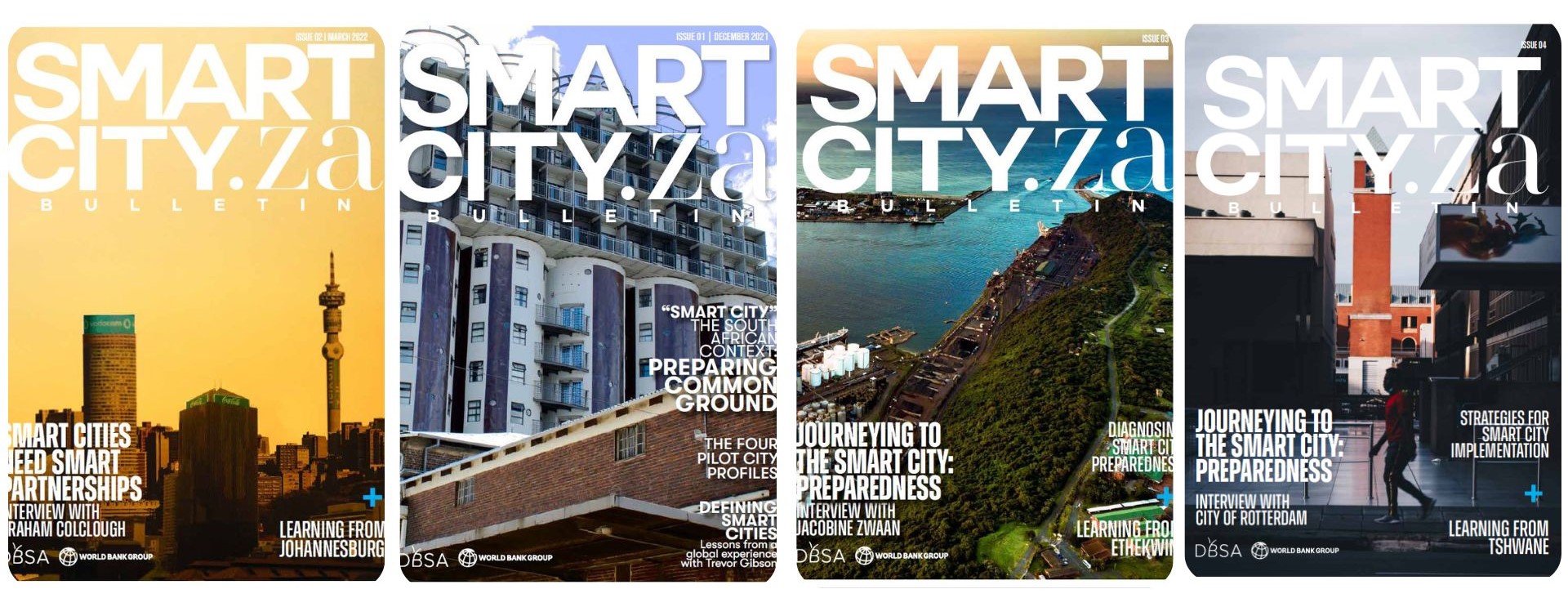
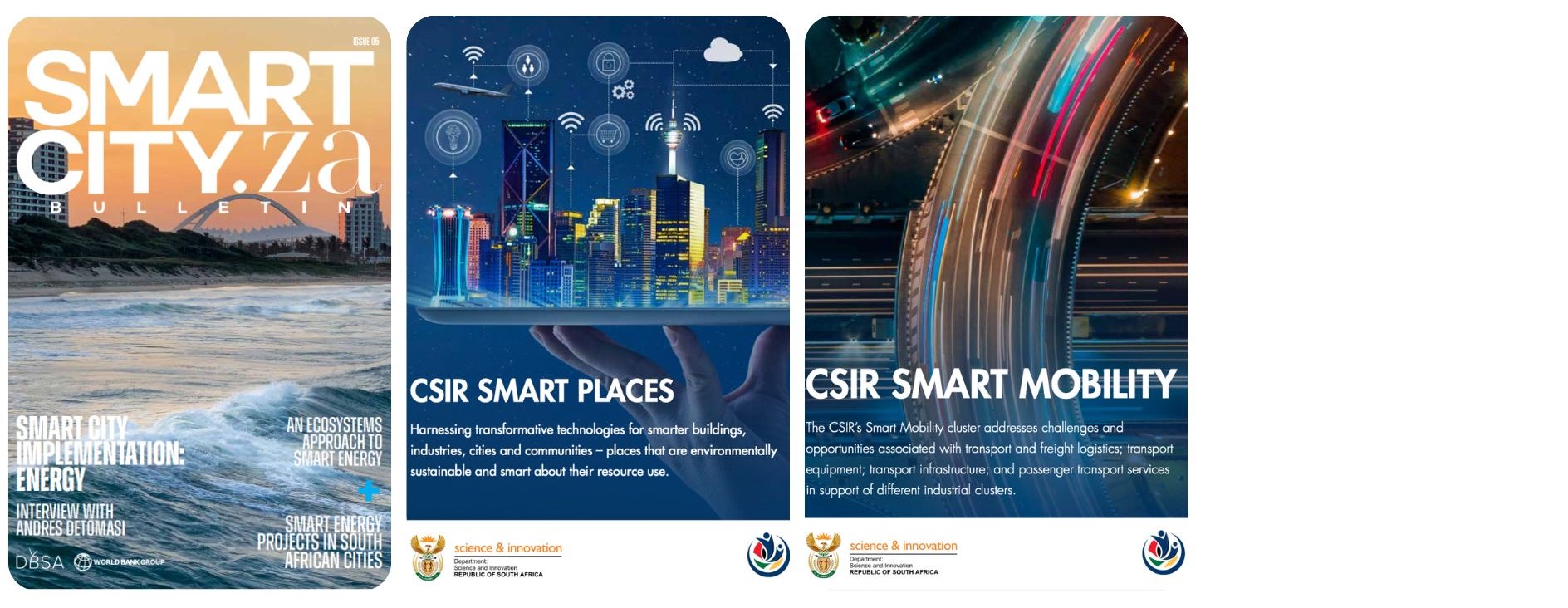
These resources have been developed by South African sources to provide contextual perspectives of smart city concepts and dimensions:
- SmartCity.ZA Bulletins (DBSA & World Bank) are periodic newsletters sharing peer-based smart city definitions, approaches and information from a 2022/23 three-city Smart CIties South Africa Pilot Programme.
- Smart City Bulletin 1: Preparing Common Ground
- Smart City Bulletin 2: Smart Cities Need Smart Partnerships
- Smart City Bulletin 3: Diagnosing Smart City Preparedness
- Smart City Bulletin 4: Journeying to the Smart City
- Smart City Bulletin 5: Smart City Implementation: Energy
- Smart Places (CSIR, 2022) looks at how we can harness transformative technologies for smarter buildings, industries, cities and communities – places that are environmentally sustainable and smart about their resource use.
- Smart Mobility (CSIR, 2021) addresses the challenges and opportunities associated with transport and freight logistics; transport equipment; transport infrastructure; and passenger transport services in support of different industrial clusters.
Working Papers
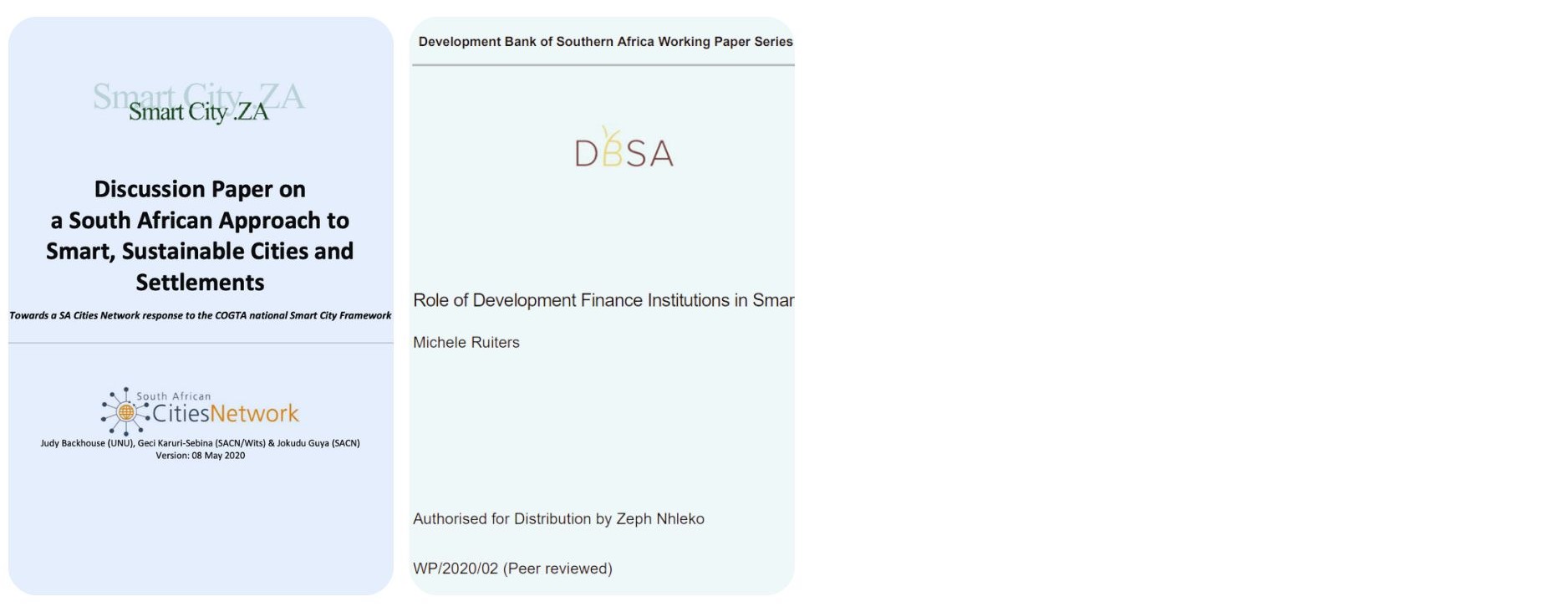
- Discussion Paper on a South African Approach to Smart, Sustainable Cities and Settlements (SA Cities Network, 2020) provides a contextualised reflection about what smart means, and what it could mean, for cities and settlements in South Africa. It is written in response to the national “Smart city framework” being proposed by the Department Of Cooperative Governance And Traditional Affairs (COGTA).
- Role of Development Finance Institutions in Smart Cities (DBSA, 2020) provides an overview of the concept of Smart Cities in a global, African, and South African context.
Policy Briefs
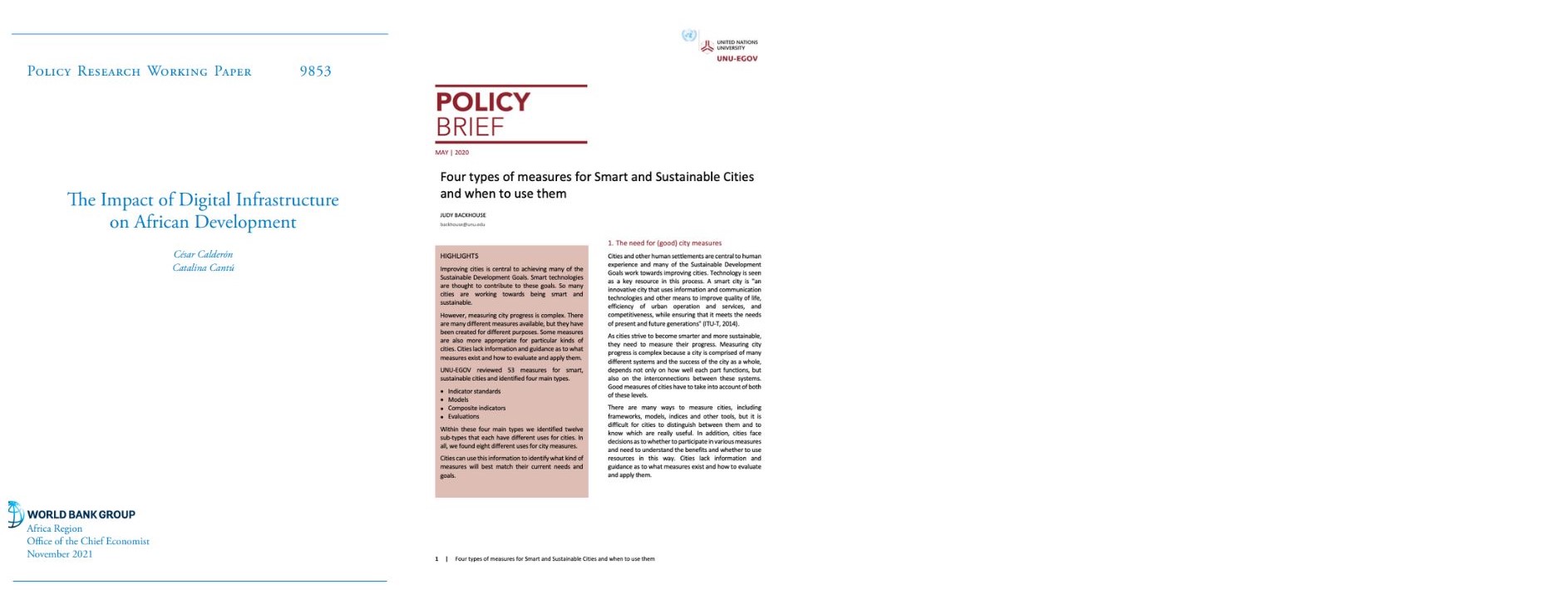
These policy briefs provide a concise summary of particular smart city issues and the policy options available:
- The Impact of Digital Infrastructure on African Development (World Bank, 2021) estimates the impact of digital infrastructure on economic growth and its sources.
- Four types of measures for Smart and Sustainable Cities and when to use them (UNU-EGOV, 2020) reviews 53 measures for smart, sustainable cities and identifies four main types.
Research Reports
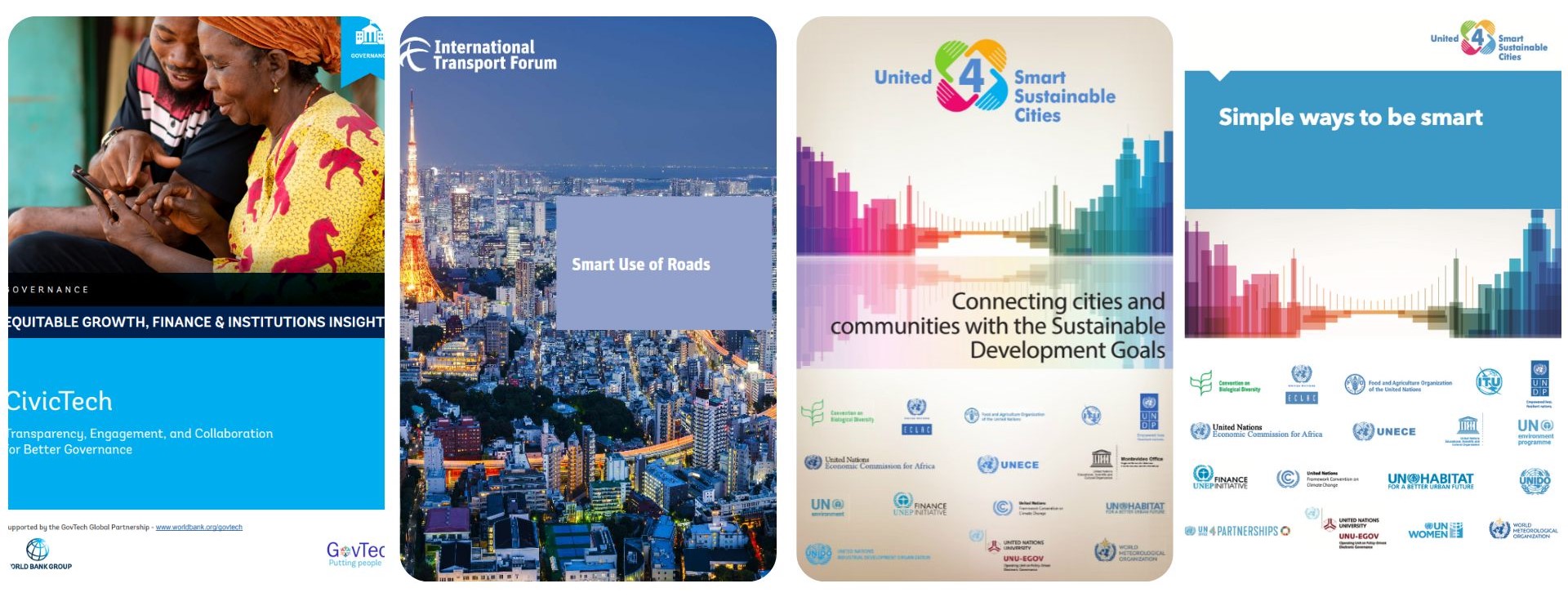
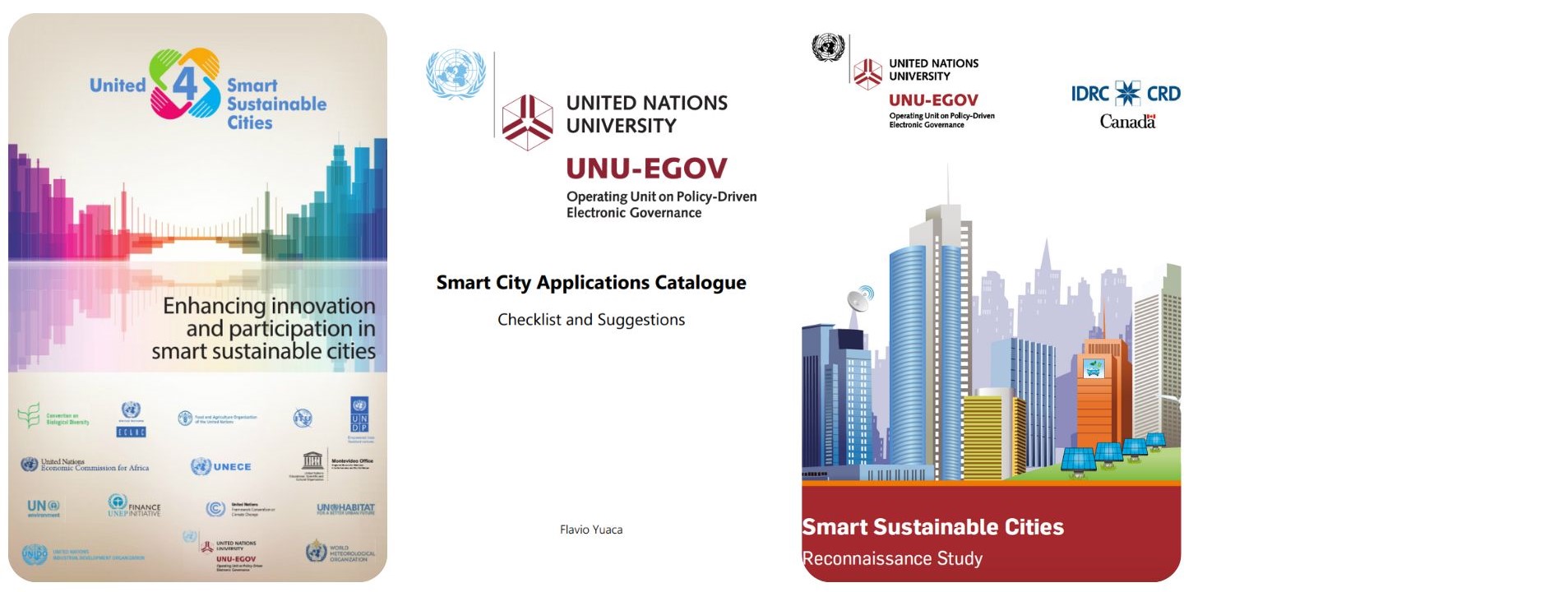
- CivicTech Transparency, Engagement and Collaboration for Better Governance (World Bank, 2022) is a how-to-note which provides advice on how to use digitalization to strengthen the engagement between governments and citizens, with various examples of what CivicTech is and why it is an important element of the GovTech approach.
- Smart Use of Roads (OECD, 2019) examines strategies and technologies applied to better utilise road networks.
- Connecting cities and communities with the Sustainable Development Goals (U4SSC, 2017) provides an overview of how cities can use information and communication technologies (ICTs) to achieve Sustainable Development Goals (SDGs) and maps the case studies to the various international agreements as well as the SDGs.
- Simple ways to be smart (U4SSC, 2021) collects examples of smart interventions and produces a guide for smaller cities and communities that wish to embark on the journey to be “smarter”.
- Enhancing innovation and participation in smart sustainable cities (U4SSC, 2017) provides a series of case studies on smart governance, smart people and smart economy, which will catapult successful smart city practices into the global spotlight.
- Smart City Applications Catalogue (UNU-EGOV, 2019) tries to understand the features that make the growing number of websites providing online catalogues of Smart City applications, useful and more likely to be used over time. It also provides recommendations as to how to improve the functioning of such sites.
- Smart Sustainable Cities (UNU-EGOV, 2016) presents the results of a study, conducted by UNU-EGOV and funded by IDRC, that examined the thesis that Smart Cities advance sustainable development.
Books & Book Chapters
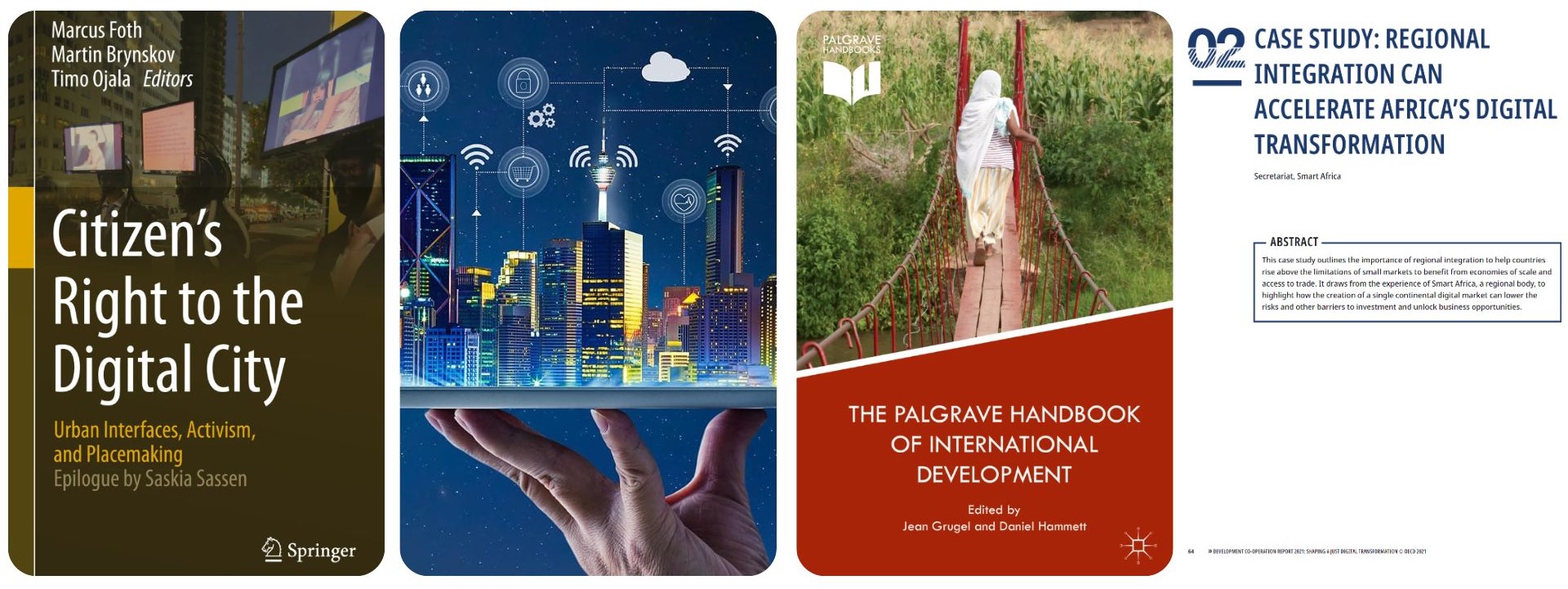
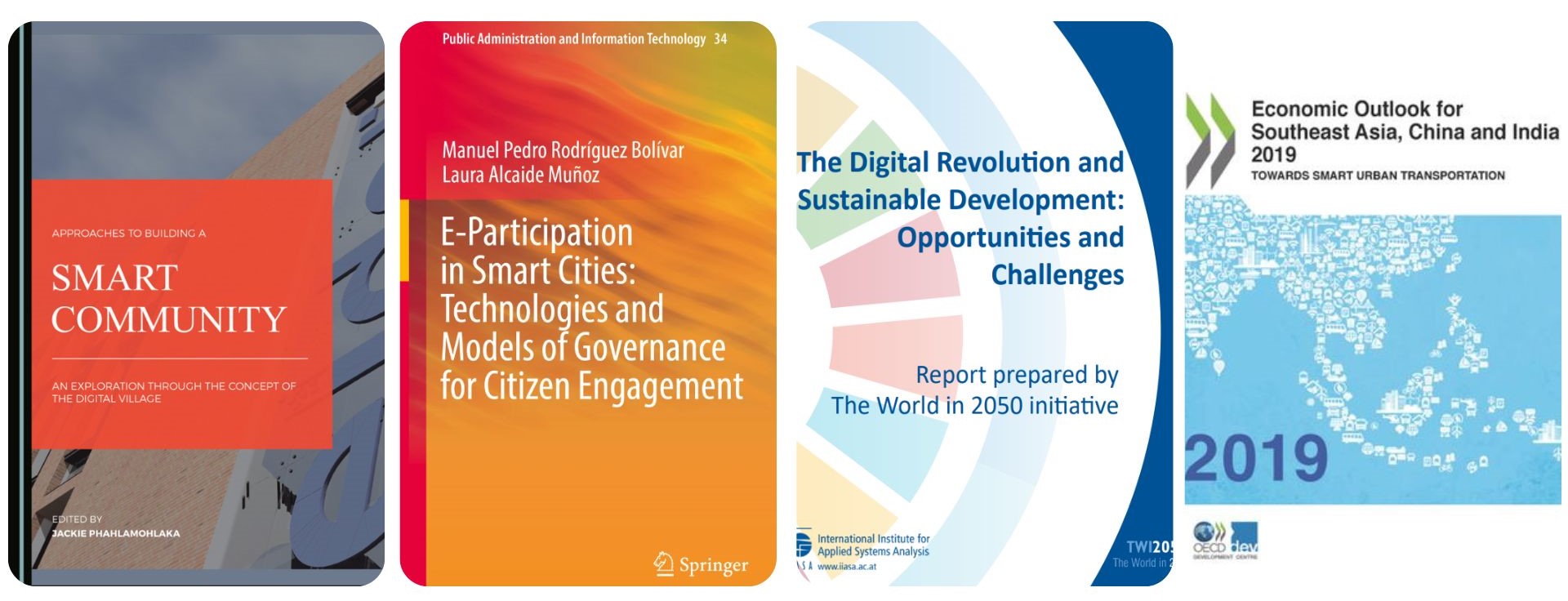
These resources provide a more in-depth study of various smart city dimensions:
- Smart Governance for Inclusive Socio-Economic Transformation in South Africa: Are We There Yet? (More Ickson Manda and Judy Backhouse, 2018) discusses the institutional mechanisms implemented to strengthen smart governance in support of the government’s long-term goals of inclusive socio-economic transformation.
- Gender equality across the board: Smart implementation for the long haul (OECD, 2017) assesses the overall institutional framework - institutions' mandates, the allocation of resources, institutional capacity, and accountability mechanisms - for furthering gender equality in Mexico.
- Towards smart urban transportation in Emerging Asia (OECD, 2019) looks at the policy options to be considered in improving urban transportation systems including the development of efficient and accessible public transportation systems; implementing pricing and other mechanisms for affecting vehicle ownership and use; reforming land use and urban planning; adopting new modes of work, including teleworking and flexible hours; and incorporating new technologies.
- Case study: Regional integration can accelerate Africa’s digital transformation (OECD, 2021) outlines the importance of regional integration to help countries rise above the limitations of small markets to benefit from economies of scale and access to trade.
- Smart City: Neoliberal Discourse or Urban Development Tool? (Nancy Odendaal, 2016) considers the trajectory of smart city debates and considers whether its social development promises are mere marketing language for the city ‘potentials’, or if it provides a meaningful frame for empowerment and progress.
- From the Fringes: South Africa’s Smart Township Citizens (Hylton Mitchell and Nancy Odendaal, 2015) focuses on the use of ICTs in the Social Justice Coalition’s (SJC) advocacy work on the delivery of sanitation to informal settlement residents.
- From “Smart in the Box” to “Smart in the City”: Rethinking the Socially Sustainable Smart City in Context (Alessandro Aurigi and Nancy Odendaal, 2015) focuses on the importance of framing and conceiving smart urban initiatives and schemes in a highly context-sensitive way, and argues that place-based approaches are essential for enhancing the social sustainability of smart cities.
- The Digital Revolution and Sustainable Development Opportunities and Challenges (The World in 2050 initiative, 2019) outline the necessary preconditions for a successful digital transformation, including prosperity, social inclusion, environmental sustainability and good governance.
- Development Impacts of Free Public Wi-Fi in Johannesburg (Judy Backhouse and Hlelo Chauke, 2020) identifies the connections between the roll-out of free public Wi-Fi by the City of Johannesburg and the changes that have resulted in city residents' lives.
- Approaches to Building a Smart Community: An Exploration through the Concept of the Digital Village (CSIR, 2021) draws on the experiences of South Africans to address the global issue of ‘smart communities’.
- Developing Smart City Ambassadors in Oman (Judy Backhouse and Laila al Hadhrami, 2022) uses a case study approach to examine the key factors of the structure and operation of an awareness and capacity development program that contributed to its success as well as the skills development outcomes that were achieved. It also discusses the potential for replicating the study as good practice in other contexts.
Academic Articles
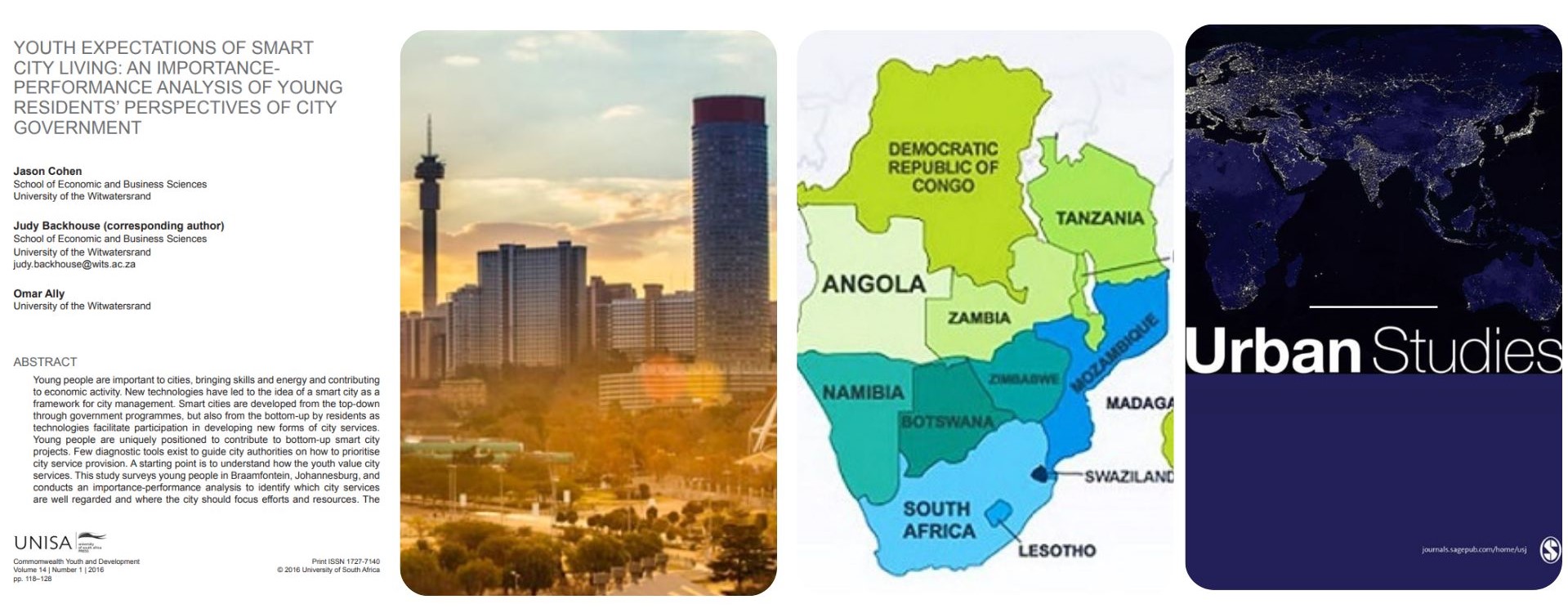
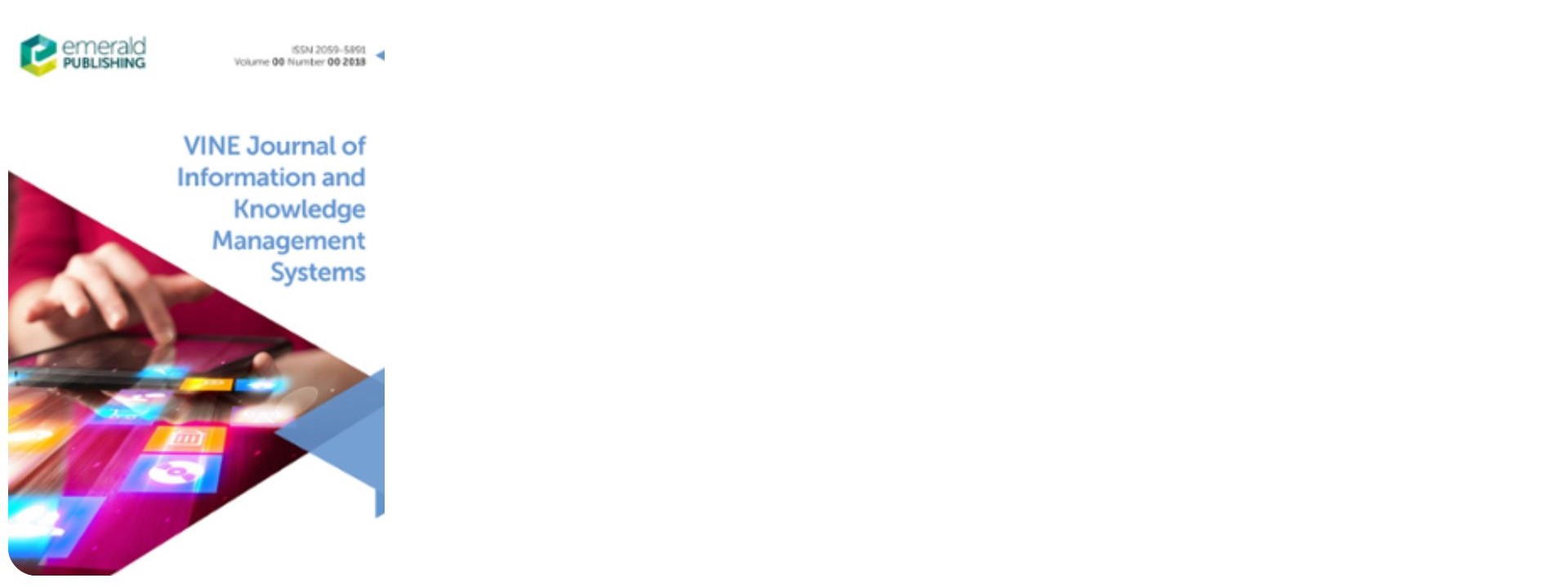
These resources consist of peer-reviewed academic journal articles:
- Youth Expectations of Smart City Living: An Importance-Performance Analysis of Young Residents’ Perspectives of City Government (University of the Witwatersrand, 2016) surveys young people in Braamfontein, Johannesburg, and conducts an importance-performance analysis to identify which city services are well regarded and where the city should focus efforts and resources. This analysis is a useful and easy tool for cities to apply.
- Digitally connected living and quality of life: An analysis of the Gauteng City-Region, South Africa (Jason Cohen, Jean-Marie Bancilhon and Thomas Grace, 2017) uses survey data to examine the relationship between quality of life and the extent to which individuals are digitally connected.
- Smart transport systems in SADC countries (University of the Witwatersrand, 2017) investigate the extent to which cities in SADC (Southern African Development Community) countries could make use of mobile apps to provide smart transport systems with low infrastructure needs.
- Everyday urbanisms and the importance of place (Nancy Odendaal, 2020) argue that by solely focusing on the material dimensions of technologically informed urban change, devoid of context, we miss an opportunity to uncover an important moment in contemporary urbanity.
- Knowledge management in local governments in developing countries: A systematic literature review (UNU-EGOV, 2021) examines the state of research into knowledge management within local governments in developing countries, to identify themes that have been studied, and to identify important gaps in the literature that can inform a research agenda going forward.
Conference Papers
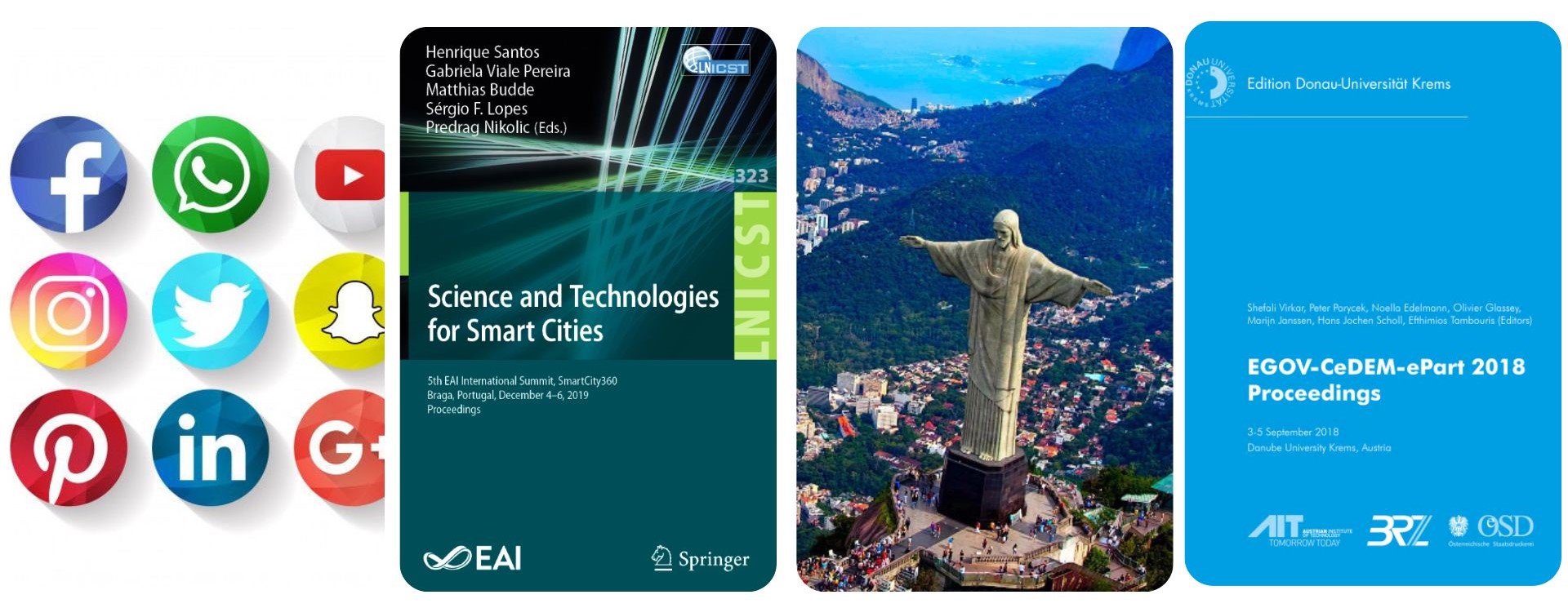

- Using personas to understand city residents’ information needs and evaluate city information services (Nelson Mandela Metropolitan University, 2016) investigates the process of using a grounded theory approach to construct personas representing different kinds of city residents and reflects on the potential for personas to lead to better-designed city information services.
- Explaining the use and non-use of smart cities services in Johannesburg: Residents' perspectives (University of the Witwatersrand, 2015) reports preliminary results of research done in Johannesburg to understand what makes people use or not use smart city services.
- Smart city agendas of African cities (University of the Witwatersrand, 2015) investigates how African cities understand the idea of a Smart City by examining what smart city agendas are being pursued in five cities on the continent and how these agendas are informed by local realities.
- What is a Smart City for information systems research in Africa?: Review protocol and initial results (Nelson Mandela Metropolitan University, 2014) sets out a protocol for a systematic review of research into information systems for Smart Cities.
- Selecting indicators for the Smart City Pilot in Knowledge Oasis Muscat (KOM), Sultanate of Oman (UNU-EGOV, 2020) presents a process for selecting the most appropriate standard indicators for the Smart City Pilot being implemented in Knowledge Oasis Muscat (KOM) in the Sultanate of Oman.
- A Collaborative Approach to Formulate a Public Strategy: The Experience of the Brazilian Charter for Smart Cities (UNU-EGOV, 2022) describes the experience of elaborating on a Brazilian strategy for smart cities.
- Opportunities, risks and challenges of using social media to foster smart governance for smart cities (UNU-EGOV, 2017) identifies the challenges, opportunities, and risks of social media usage for smart cities to foster smart governance, based on scientific literature.
- A Review of Measures to Evaluate Smart Sustainable Cities (UNU-EGOV, 2020) presents preliminary results of a review of tools that claim to measure aspects of the state of a city, related to the smart, sustainable city concept. Using academic literature as well as online searches, over 50 tools were identified, including standards, indices, and models, that each measure a range of city attributes.
- A taxonomy of measures for smart cities (UNU-EGOV, 2020) reviews academic and practitioner literature, as well as websites and identifies and examines fifty-three different measures for cities. From this analysis, a taxonomy of smart city measures is presented.
- Gendering the Smart Cities: Addressing gender inequalities in urban spaces (UNU-EGOV, 2022) aims to advance the debate on gender and smart cities. Smart cities, with technology as a basic component in urban management, are initiatives seen as a path towards sustainability and inclusiveness.
- Pakistan Smart Cities Context: Lahore and Multan (UNU-EGOV, 2018) analyses the readiness of Lahore and Multan Pakistan cities for starting a smart city (SC) transformation. The methodology used was case-oriented comparative research drawn on a conceptual framework for facilitating the analysis.
Back to the SmartCity.ZA group page.

Comments